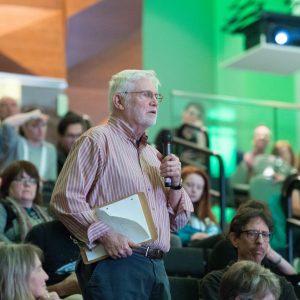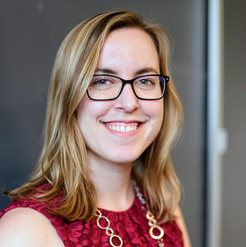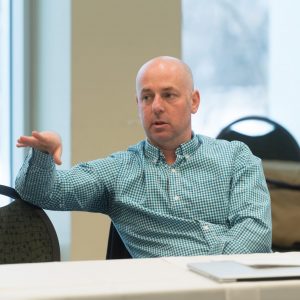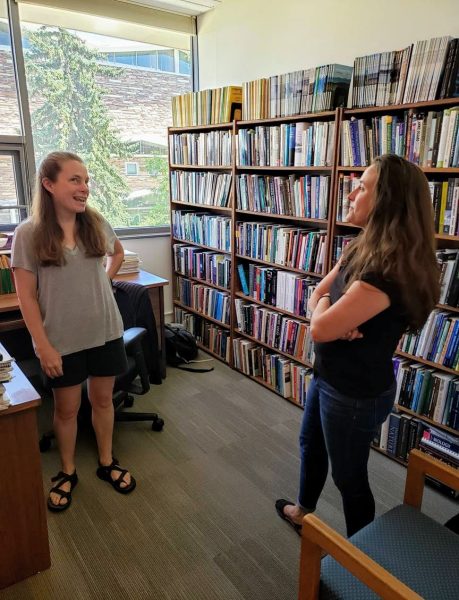Goodbyes, Hellos, and Congratulations
This summer marks a complete transition of our administrative team. Gaylene Wolfe (office manager) and Lorraine Dunn (administrative assistant) retired this spring after years of dedicated service. The office welcomes Abby Marweg (hopping over from Ethnic Studies) to serve in a new role, Assistant to the Chair.
We also say goodbye to John Didier, our chair for the past five years. John will be on sabbatical during the 2019-2020 academic year, during which time he will prepare his translation of the 10th-century Chinese “Book of Transformation” (Hua Shu 化書) for publication. He will return to the faculty of the history department next fall. Thank you, John, for your excellent leadership. John’s replacement, Matt MacKenzie, began his term as Chair on July 1.

This spring also marks the retirement of Mike McCulloch, our dear friend and colleague. In 1970 Mike McCulloch came to the department from his PhD program in philosophy at Michigan. Previously he had studied in Detroit to be a priest of the Catholic Church. Over nearly fifty years Mike has taught expertly every course in Western philosophy and religion that the department has offered. The members of the department will miss Mike’s laughter, generosity, and stories in the years to come.
Finally, we congratulate three colleagues on their exceptional achievements this academic year: Dustin Tucker earned tenure and was promoted to Associate Professor; Ken Shockley was promoted to Full Professor; Bernie Rollin marked his 50th year at CSU. A heart-felt congratulations from us all!
Student & Alumni News

Kate C.S. Schmidt (B.A., 2012) has just completed her PhD in the Philosophy-Neuroscience-Psychology program at Washington University in St. Louis with a focus on epistemic justice and epistemic participation. Her research explores epistemic injustice, or the ways that prejudice warps knowledge practices in unjust ways. She feels Jeff Kasser’s encouragement and support with her honors thesis at CSU, “Inquiry and the Ethics of Belief,” made it possible for her to complete the dissertation process. Kate is returning to Colorado and will begin her position as assistant professor of philosophy at Metropolitan State University of Denver this fall.
Graduate students Jackson Colter and Jordan Davis, along with instructor Steve Williams (M.A. 2018), are volunteering with Wyoming Pathways from Prison over the summer. The program offers a Philosophy in Prison/Stoicism summer course in Wyoming correctional facilities. The course is an intensive weeklong introduction to Stoic philosophy and its practical application to incarcerated men and women. Students read, critically analyze, and discuss core Stoic texts, including Epictetus’ Enchridion and Marcus Aurelius’ Meditations, and then apply Stoic principles through daily practical exercises. In 2018, Jackson and Steve volunteered to help teach the class at the Wyoming Women’s Center in Lusk, Wyoming. In 2019, Jordan will join Jackson and Steve to help teach classes at the Wyoming Honor Farm in Riverton and the Wyoming Medium Correctional Institution in Torrington.
Two months after defending his thesis on Environmental Ethics at CSU, Addison Phillips (M.A. 2018) began working for the Transportation Division of the Colorado Energy Office. His work focuses primarily on programs and policies to promote the electrification of transportation in Colorado. Some of their specific initiatives include: funding community-based charging infrastructure throughout the state, funding an EV charging company to build a state-wide network of fast charging stations, and working with utilities to design rates that promote both fair electricity prices for electric vehicle charging and encourage the use of renewable energy for charging. Addison first became interested in electric vehicles while living in Budapest, imagining how much higher the quality of life would be in the city if all of the vehicles were powered by electricity instead of diesel or gas. During his second year at CSU, he worked part time for a national non-profit that works to advance transportation electrification across the U.S. This organization operated the Drive Electric Northern Colorado program in Fort Collins.
Faculty News
Andre Archie delivered a paper on nationalism and antiquity at a conference in Washington, D.C. sponsored by the Edmund Burke Society this summer. His 2010 article on thought experiments will be anthologized in Philosophical Imagination: Thought Experiments and Arguments in Antiquity (Cambridge Scholars Publishing). Andre will be on sabbatical for the Fall 2019 semester. During that time, he will continue to work on his contracted manuscript, Socratic Conservatism, Socratic Questions, for The Catholic University of America Press.
Laura Arcila Villa taught a new course on Latin American Philosophy to an enthusiastic group of students this past spring. She also gave a paper, “Anne Conway’s Rejection of Spinoza’s Pantheism,” at the regional meeting of the American Academy of Religion/Society of Biblical Literature (Rocky Mountain-Great Plains Region) at Creighton University. Laura had a busy end to her semester, including participating in a two-day TILT workshop on improving students’ first four weeks, serving on a MA committee in counseling and career development, and traveling to Richmond, Indiana to receive her MA in Religion from Earlham School of Religion. Congratulations, Laura!
Ashby Butnor spent half of this past academic year traveling around the world, along with her family, 440 students, and faculty, staff, and crew with Semester at Sea. In addition to teaching and participating in service projects in Ghana, South Africa, and India, she presented “The Ethics of Global Poverty: Why and How We Should Care about (not so) ‘Distant Others’” during an evening seminar on the ship. This past spring, Ashby hosted a successful alumni panel for philosophy majors, “Creating Your Own Path: How to Survive the Bumps and Setbacks of Post-Grad Life.” She also serves as the faculty representative on the University-wide Student Success Implementation and Assessment Committee.
Philip Cafaro continued his work as co-principle investigator with The Overpopulation Project, an interdisciplinary research team headquartered at the University of Gothenburg, making two extended research trips to Sweden. This work generated two co-authored publications, “Aging Human Populations: Good for Us, Good for the Earth” in Trends in Ecology and Evolution and “How Should Ecological Citizens Think About Immigration?” in The Ecological Citizen, as well as the working paper “New Policy-based Population Projections for the European Union, with a Consideration of their Environmental Implications.” In addition, Phil served as faculty advisor for a newly reinvigorated Philosophy Club and for CSU’s student chapter of the Rocky Mountain Wolf Project, a group dedicated to reintroducing wolves into Colorado.

Last fall, Moti Gorin commented on a paper at the Southwestern Philosophical Society conference in Denver. The commentary, “Collective Action Problems, Causal Inefficacy, and Virtue,” will be published in the Southwest Philosophy Review. Moti’s co-authored “Social Media, E-health, and Medical Ethics,” came out in the winter edition of The Hastings Center Report and was featured in the CLA Magazine this year. He also co-authored, with grad student Jesse Gray, a peer commentary on Robert Sparrow’s work on human enhancement and the problem of obsolescence (American Journal of Bioethics, June 2019). Moti is the coordinator of the Works in Progress series, which featured presentations by faculty Domenica Romagni and graduate student Shade Hannum this spring. He also oversees the Bodaken Philosophy Symposium series that included three visiting scholars this past year.
Jeff Kasser published two articles and gave one talk this year on his favorite philosopher, Charles Peirce. “Normativity and Naturalism in ‘The Fixation of Belief’” is the lead article in the most recent issue of the Transactions of the C.S. Peirce Society. The other paper, “A One-Lane Road To Representationalism?,” is a contribution to a symposium on Robert Lane’s Peirce on Realism and Idealism and appears in Syndicate Philosophy. He also presented a paper on probability and Peirce’s theory of inquiry at the Eastern Division meeting of the American Philosophical Association meeting in New York City in January. Jeff taught a new graduate seminar on the stability of belief and the value of knowledge in the fall. He also joined with some faculty in the College of Natural Sciences to help lead a reading group on the philosophy of probability and statistics, in addition to participating in an interdisciplinary faculty panel at Avogadro’s Number as part of the Science on Tap series in May.
Richard (Dick) Kitchener published three articles this year: “Epistemological Behaviorism” in Behavior and Philosophy (2018); “The Epistemology of Folk Epistemology” in Analysis (2019), and “Epistemic Cognition” in New Ideas in Psychology (forthcoming).
Matt MacKenzie has two publications to report this year: “Virtue, Self-Transcendence, and Liberation in Yoga and Buddhism,” in Self-Transcendence and Virtue: Perspectives from Philosophy, Psychology, and Theology (Jennifer Frey and Candace Volger, eds, Routledge 2018) and “Reflexivity, Subjectivity, and the Enacted Self,” in Problem of the Self: Consciousness, Subjectivity, and the Other (Manidipa Sen, ed, Aakar Books 2019). Matt also gave three presentations this year—all in or near India. While teaching on Semester at Sea in Fall 2018, he presented “Luminosity: Consciousness in Indian Philosophy” for the shipboard community in an evening seminar. He returned to India in March 2019 to present “Self as a Dynamic Construct: A Pragmatist-Enactivist View” at the Understanding the Self conference at Jadavpur University as well as “Luminous Cognizance: Toward a Buddhist Model of Consciousness” at Rabindra Bharati University in Kolkata.
In addition to her work as Director of Graduate Studies, Katie McShane gave three academic talks this year: “Against Etiological Function Accounts of Interests” at Texas A&M University in September 2018; “Units of Analysis in Philosophy of Biology, Conservation, and Environmental Ethics” at the International Society for the History, Philosophy, and Social Studies of Biology Cognate Session of Philosophy of Science Association Biennial Meeting in Seattle in November; “Biocentrism, Teleocentrism, and the Moral Importance of Interests” at the Groupe de Recherche en Éthique Environmentale et Animale in Montreal this past April.
Nathalie Morasch presented her paper “Inquiry-Centered Notion of Words” at the Metaphysics of Words conference in Genoa, Italy in June.
Kelsi Nagy (M.A. 2005) has been busy teaching sections of our popular Environmental Ethics course on campus. She also published “The Sacred and Mundane Cow: The History of India’s Cattle Protection Movement” in the Routledge Handbook of Religion and Animal Ethics (eds. Andrew Linzey and Clair Linzey) last fall. The chapter evolved from a paper she presented at the Oxford Center for Animal Ethics Summer School on Animals and Religion in 2014. Kelsi is also a Fellow at the Oxford Center for Animal Ethics.

Bernie Rollin celebrated his 50-year anniversary at CSU this year. Congratulations, Bernie! In addition to his many, many committee appointments across the University, Bernie was the keynote speaker at the annual dairy cow welfare symposium in Orlando this spring. In Bernie’s words, “Not bad for a kid who grew up in Brooklyn!” He also gave the CSU Phi Beta Kappa induction speech this year.
Our newest faculty member, Domenica Romagni, gave a number of talks this year. She co-presented a paper, “Stoic Antecedents of Cartesian Rationalism,” to the Descartes Society at this year’s Eastern Division meeting of the American Philosophical Association. She was also invited to give a talk titled “Kepler’s Mathematical Epistemology” at the NY/NJ Seminar in Early Modern Philosophy at the John Jay College of Criminal Justice in April. And, this summer, Domenica traveled to London to present “A Systematic Treatment of Rule-Breaking in Music: How Can Wrong Notes Be Right?” at the 2019 Biennial Meeting of the Royal Musical Association Music & Philosophy Study Group. Domenica also designed and taught a new course, Music & the Mind, this spring.
Ken Shockley served as head of the CSU delegation to and an official observer at the United Nations climate change talks (UNFCCC COP24) in Katowice, Poland in December. During his travel to Europe, he also gave invited talks at the University of Pardubice, Czechia, and the Leuphana University in Lüneberg, Germany. Closer to home, Ken served as a session chair at the Central APA in Denver in February and as a discussant for a pair of panels at the Western Political Science Association meetings in San Diego in April. On campus, Ken was an invited speaker at CSU SEEDS chapter club (Strategies, Education, Ecology, Diversity, and Sustainability, sponsored by the Ecological Society of America) in the fall. Ken published “Sustainable Development Goals and Nationally Determined Contributions: The Poor Fit between Agent-Dependent and Agent-Independent Policy Instruments” in the Journal of Global Ethics this year. This summer, Ken once again had a fantastic experience teaching Environmental Ethics at CSU’s Mountain Campus. He’s now busily preparing to set sail on the Fall 2019 voyage of Semester at Sea.
Beth Tropman published the chapter, “Metaethics,” in Wiley Blackwell’s Companion to Atheism and Philosophy. She also presented a paper, “How to be an Aesthetic Realist,” at the American Society for Aesthetics Pacific Division meeting this spring.